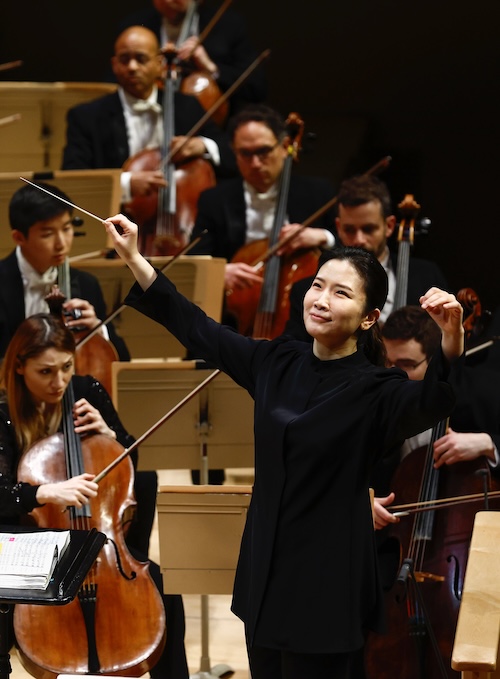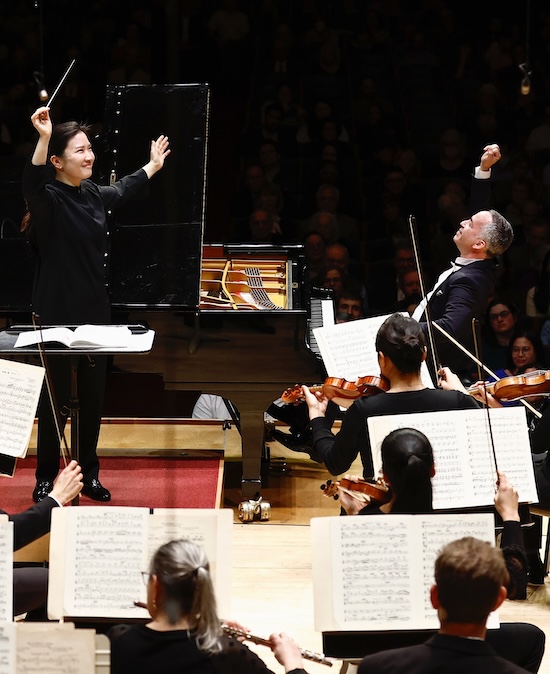Kim makes impressive BSO debut in varied works of wartime

Eun Sun Kim conducted the Boston Symphony Orchestra in music of Liadov,. Bartok and Rachmaninoff Thursday night. Photo: Winslow Townson
The Boston Symphony Orchestra presented a program of Liadov, Bartók, and Rachmaninoff Thursday evening at Symphony Hall. Led by conductor Eun Sun Kim in her BSO debut and featuring pianist Inon Barnatan, the program was an exploration of the intense and various musical landscapes of the early 20th century
Dubbed “Music in the Shadow of War,” Thursday’s program segued from the escapist fantasies of Liadov to the bombast of Rachmaninoff, offering a diverse array of responses to the violent upheavals—both social and musical—of the pre- and interwar period.
The program opened with Liadov’s The Enchanted Lake, a “fairy tale scene” in which Liadov evokes the picturesque Lake Ilmen of his Russian home. The work opens with an extreme pianissimo in strings and harp, and here Kim demonstrated her focus on the dynamic contrasts of the program—a choice that would become essential to the success of her interpretation of Bartók and Rachmaninoff later in the evening.
The shimmering harmonies created by the strings, with the gently modulating motifs of the winds, created an atmospheric effect that Kim directed through the climactic moments of the piece that began, grew, and faded away like a dream.
Following Liadov was Bartók’s Piano Concerto No. 3—a hyper-intellectual contrast to the more whimsical Liadov piece. Written while in exile from Hungary in America, Bartók’s last completed composition is somewhat more accessible than his earlier work in the genre while still featuring the composer’s playful interest in defamiliarizing the building blocks of 20th century musical culture.

Inon Barnatan performed Bartók’s Third Piano Concerto with Eun Sun Kim and the BSO Thursday night. Photo: Winslow Townson
Barnatan played with both humor and pathos, moving deftly between the rapid folk melodies, witty inversions, and sensitive choral passages of Bartók’s concerto. Kim negotiated beautifully between soloist and orchestra here, leaving ample room for Barnatan’s virtuosity while also maintaining the contrast between soloist and ensemble that illumes the characteristic dissonances of Bartok’s style.
The second movement was a highlight of the evening. Following the dazzling array of styles of the first movement, the simple chorale of the Adagio Religioso was a moment of peaceful suspension. Here the harmonic shifts of the strings framed the choral progressions in the piano, which Barnatan played almost in the style of an étude. The result was a piece that simultaneously expressed the sublime potential of orchestral harmony and the fundamental musical motions upon which it is based. The Allegretto interlude of the second movement unified soloist and orchestra, as the winds and piano traded the bird-like motifs between them, bringing the concerto to the raucous third movement.
Featuring Bartók’s signature folk melodies, Barnatan divided the third movement between displays of technical virtuosity and crashing intensity. Punctuated by rhythmic timpani, Barnatan delivered what seemed a retrospective of Bartók’s many stylistic experiments—a fitting conclusion to the composer’s work.
After a thrilling Rondo, featuring Bartók’s signature folk melodies, Barnatan responded to audience enthusiasm with an encore, Ukrainian composer Valentin Silvestrov’s Serenade from his Four Pieces, Op. 305. As Barnatan delivered Valentin’s quiet melody, he offered another silent reflection on the shadows of war in our own time.
As the program’s second half began, the sparkling perfection of the Rachmaninoff emphasized the excellence of the orchestra’s principal players. In recent years, the Boston Symphony has replaced many retired performers with new faces. While these new additions delivered a beautiful first half, the entrance of old hands in the winds and brass moved the orchestra to the height of perfection for which it is known.
After an expressive solo by assistant principal cellist Oliver Aldort, the opening Lento of Rachmaninoff’s symphony gave way to a swift Allegro, which the orchestra delivered with the precision of an entirely unified corpus.
Again, Kim’s early insistence on the dynamic diversity of the program paid off here in her excellent management of Rachmaninoff’s music, which begins early in the first movement and continues throughout the symphony. Her careful reading of the dynamics kept the piece just on the edge of overwhelming and held audience interest throughout the 40-minute symphony.
The second movement opened with solos by principal horn Richard Sebring and assistant concert master Elita Kang. The two longtime BSO members played together sensitively, accompanied by principal harpist Jessica Zhou. Indeed, this second movement seemed to combine Bartók’s active concerto with Liadov’s dreamy fantasy.
The final movement was an exciting dance, with sparkling additions from the percussion that drove the symphony’s vibrant conclusion. Kim maintained the intensity of the piece throughout for a most impressive BSO debut.
This program will be repeated 1:30 p.m. Friday and 8 p.m. Saturday. bso.org
Posted in Performances